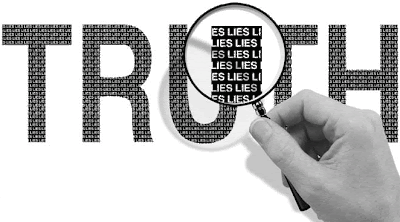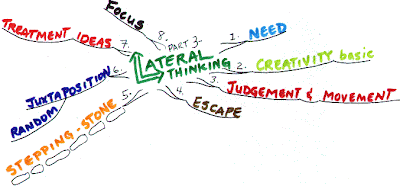Assertive people stick their feet to the ground;
have their heads over their shoulders and truth committed to their words.
Setting a target and refusing to budge from it is a sign of perseverance and
focus. However, failing to set targets in the first place owing to lack of
interest; and subsequently justifying personal misfortunes based on unawareness
and bad luck is self-defeating stubbornness. The rigid stand strong; but they
know when to bend, to defend themselves from breaking. Perfectionism is much
coveted but seldom attained. When goals are not set right, they indeed cannot
be accomplished spot on. Inflexibility is not a virtue…
Feb 28, 2013
Rigidity: Good or bad?
Labels:
can,
cant,
commitment,
don't,
inertia,
inflexibility,
neurons,
rigidity,
rubber-band,
stubbornness,
transformation,
transmutation
Feb 27, 2013
Change: a problem or solution?
Change is an inevitable constant; revolution
is the unwritten law and variation is the only indisputable surety. While at one
end change is understood to be absolute and predictable; there is also constant
bickering when it occurs. If only the mind, body, intellect; and each one’s
environment changed in synchrony. Erraticism in the external world is condemned
by all; even though eccentricities in one’s own behavior are estimated as defensible.
Most of life’s inadequacies would seem fulfilled if one could welcome change: in
oneself as well as the world around us…
Labels:
accomodate,
adapt,
assimilate,
change,
comfort,
consequences,
endurance,
fight,
inertia,
metamorphosis,
resistance
Feb 26, 2013
Why behavior doesn't change
In spite of applying different reinforcers,
offering attractive rewards, threatening with punishment and confiscating
pleasures; behavior somehow doesn't budge. Children continue to misbehave,
partners argue with each other, employees complain and maybe lose their jobs and delinquents incessantly break laws without fearing negative consequences. Life is not all
science and math. Logic frequently fails and the world seems to be left in a
sticky situation with regard to righteousness. Behavior is observable. Any
behavior (by anybody) impacts the world around each one of them in some way or
the other. No one thrives in a vacuum. The real world has genuine troubles,
actual situations and factual problems; thus we need realistic solutions…
Labels:
bad,
behaviors,
good,
habit,
myopic vision,
plasticity,
problems,
punishment,
reinforcers,
solutions
Feb 25, 2013
Reinforcer 4: Negative punishment
A conventional probability of defined outcomes
raises the prospect of certain behaviors if there is a well-established
contingency pattern between them. If you know that action A is going to root
action B (which already is something you deeply desire) it’s natural for you to
follow that particular behavior pattern. Behaviorism is a well-researched but quite a convoluted
science. Nonetheless, its practical implications are as lucid as common sense. An action
that brings favorable outcomes usually reinforces itself. And behaviors that need to be reinforced get implanted according to the strategies that have been used to cement them. There are several reasons why humans behave the way they do. These ought to be suitably understood to improve conduct. We know the 4 typical
behavior modification paradigms:
- Action followed by reward should lead to repetition of that action
- Behavior succeeded by punishment must decrease its frequency
- Deeds that prevent negative consequences tend to get reinforced
- Actions that cease positive outcomes should diminish themselves
Labels:
behavior,
behaviorism,
negative punishment,
omission training,
principles,
reinforcement,
reinforcer,
removal of reward
Feb 24, 2013
Reinforcer 3: Negative Reward
Some connects get stronger simply on
account of the time that they have lasted. Habits are simply thoughts and
behaviors that have persisted over time. Plasticity is a trait that is indeed
innate to the brain cells; each one can change his or her behavior as and when
they choose to. However more often than not, the mind gets accustomed to the
inertia that sets in after incessant stagnation in thought and feeling. Reward
and punishment enhance and diminish certain performances respectively; however
the mind works analytically to alter behavior using alternate reinforces like
negative reward too…
Labels:
change,
negative reinforcement,
negative reward,
prevent bad consequences,
punishment,
relationships,
reward
Feb 23, 2013
Reinforcer 2: Punishment
Behaviors require a powerful meshwork of
reinforcement for them stand strong. Habits may be regarded as behaviors that
have solidified over time with constant cementing; they seem rigid and unbreakable.
Reinforcers are to be applied rightly to shape behavior appropriately. While
reward may seem like the commonly applied reinforcer, punishment is more than
often used in homes, schools, as well as society at large to terminate negative
and ill behaviors.
Reinforcer 1: Reward
Behavior Change
Behavior demands contingency responses that
strengthen or weaken its chances of repetition. Everything that a human does is
typically expected to instigate reaction in another. These reactions themselves
form the behavior of other individuals. The cycle pretty much continues until
these behaviors of people begin to influence their emotions and thoughts. The
chicken lays the egg and the egg hatches into yet another chicken. The child is
the father of the man who gives birth to yet another child in time. Behaviors
of people incessantly impel each other to change for better and occasionally worse
too. The transformations need to be appropriate to match the interpersonal
requirements in order for the outcome to be apt. Cement ought to be rightly
applied, else it solidifies in erroneous positions; behavior can get wrongly
reinforced with crooked outcomes.
Labels:
behavior,
cause effect,
evidence,
extinct,
internal driver,
reinforcer,
reward,
right rewards
Feb 21, 2013
Need to want to need...
Deficiency of a few things in life may cause severely negative outcomes: food, clothing, shelter, water, even love. These things are indispensable for subsistence and are categorized as ‘needs’. They are often subjective and felt differently by people. There is a frequent mix-up of needs and wants and the underlying emotional tone of needs and wants time and again adds to the confusion.
- I need to get through this exam
- I need to lose 5 kgs this month
- I need a new outfit for the prom
- I need this new job desperately
- I need to teach him a lesson
- I need to win the beauty contest
Labels:
actualization,
balance,
belief,
desires,
gluttony,
greed,
meaningful,
need,
ravenous,
survival,
want
Feb 20, 2013
Traditionalism...why?
Labels:
blind faith,
chains,
conformism,
conformity,
disobedience,
mindfulness,
rebellion,
responsibility,
traditionalism
Feb 19, 2013
It's a new day!
There come those days when you fail to assess rightly who you truly are, why you actually exist and what indeed is the purpose of life. Self-esteem today has been added to the gamut of basic human needs. According to Maslow’s hierarchy, one cannot soar to the heights of actualization without fulfillment of the need for self-worth. Respect from the external environment as well as from within oneself seem imperative for serenity; however greater the focus on the self; higher are the chances of peace. The sun rises each day, deliberately and consistently; it offers its warmth and radiance with impartiality. Each one is offered equal opportunities; they simply choose to use them differently. That is what makes all the difference…
Feb 18, 2013
How gullible are you?

Vulnerability
It’s a beautiful world we live in; yet it has its blemishes. Many love and regard unconditionally, while several are callous with the emotions of another. In a world that pronounces war (several times a day at times) one needs to have defenses set veraciously to cope with character attacks. No-one can stay shielded from criticism. Where there is a tongue there is speech and gossip. Feebleness has become an everyday defense for self-conservation by those who don’t have the courage in their conviction. It preserves the self but sacrifices respect. Vulnerability is the equipment to avoid antagonism from a hostile environment. There is transient suspension of one’s rationality and self-regard and in that time window, the wolves attack and overpower the barricades, allowing one to lose personal judgment and give in to the whims of others because there simply isn't any other path to yield.
- I am humiliated every day, but he’s my boss; he’s authority!
- I am overweight they will always ridicule me, I needn't fight back
- I am overweight! My friends make fun of me, but I can’t do anything!
- This is how it is for me; people will not change how they think about me!
Labels:
brainpowers,
environment,
gullible,
helplessness,
hostile,
negative bias,
stressors,
susceptible,
trust,
vulnerability
Feb 17, 2013
Not so super…superstition
What we know
Science has attempted to offer elucidation of everything; the gender of an unborn child, estimate of earthquake strength, and prediction of hailstorms to prospects of success; it even explicates the rise of criminality based on statistical calculation. Events that inspire awe and amazement may arouse curiosity about their causality, and when it fails to surface, attributions that by pass science become rampant. When there is no physical process linking the cause an event, it classically qualifies superstition (according to the evolved lot of humans). When you know why it happens; its science, when you don’t, its superstition.
Science has attempted to offer elucidation of everything; the gender of an unborn child, estimate of earthquake strength, and prediction of hailstorms to prospects of success; it even explicates the rise of criminality based on statistical calculation. Events that inspire awe and amazement may arouse curiosity about their causality, and when it fails to surface, attributions that by pass science become rampant. When there is no physical process linking the cause an event, it classically qualifies superstition (according to the evolved lot of humans). When you know why it happens; its science, when you don’t, its superstition.
Labels:
belief,
placebo effect,
science,
self fulfilling prophecy,
statistics,
super,
superstition
Feb 15, 2013
Why you are who you are
Individuals seek answers regarding their behavior when probed on their performance. Why they do what they do, how they are the way they are and what drove them to get where they did. Self-appraisal is a healthier option; nonetheless soul searching can be unquestionably instigated by the innate versus empirical debate when people are asked why they are who they are.
- How is it that you are so beautiful?
- Your aptitude puts all of us to shame!
- How did you get promoted so easily at work?
- How do you manage to excel in studies always?
Labels:
believe,
change,
empiricism,
evolve,
influencers,
innatism,
nature,
nurture,
personalities,
tabula rasa
Feb 14, 2013
Need to cheat...
Competition if healthy is a promising driver. The brain is too accustomed to the impact of endorphins and dopamine that offer wellness. That’s why rewards are recompensing incentives. However, coveting a prize after hard work and dedication is the ingredient to success. Unlike cheating, which may be classified as a fancy, speedy and laidback trail to triumph. The world thrives on shortcuts while morality and honesty are nearing extinction. Rules broken by a cheater may be explicit or part of an unwritten code; in certain cases making cheating more of a subjective process with frequent justifications for committing them. Needless to say, cheating is immoral, unethical and inappropriate.
Labels:
cheat,
conscience,
facade,
forgiveness,
humanity,
lie,
need to cheat,
permission,
personality,
traits,
victory
Feb 13, 2013
The bone of envy

This planet offers numerous reasons for unhappiness: wants, desires, expectations, impulsivity, greed, and dissatisfaction; however the most promising one that assures grief is envy. The potency of envy is tremendous. Resentment towards another owing to perception of lack of something that the other person possesses is hardly the emotion expected of an actualized soul. Envious people are not simply resentful within themselves; they wish to inflict adversity on the object of their envy. From a psychological standpoint, envy could be a tool for improvement and motivation; if only used constructively. Benign envy is an inspiring force…
Labels:
adversity,
aptitude,
burn,
constructive envy,
Darwin,
envy,
motivation,
resentment
Feb 12, 2013
The truth about lies
A deliberate statement, known by the
speaker of it to not be the whole truth; is reasonably inexcusable. A lie may
justify good in certain situations; however the nobleness and politeness of the
lie still doesn't transform it into truth. The philosophy of lying has been
well researched, varying views, diverse opinions and assorted arguments, all of
which have dissected lies into justifiable versus unpardonable breaches of
faith and trust; something that today’s sphere needs to thrive and survive.
Labels:
barefaced lie,
bluffing,
fibbing,
habitual liar,
lies,
noble lie,
perjury,
puffery,
truth,
Truth Wizard
Feb 11, 2013
Falling out of love
Creation always warrants time and sweat
while destruction typically occurs in a jiffy. It takes 40 weeks for a
fertilized ovum to transmute into a well differentiated human being; however
life could end in moments if things went wrong. Annihilation is a rapid
phenomenon. It takes prodigious determination to survive and thrive. Relationships
are no different. They need consistent nurturance and replenishment of energies
to sustain themselves. Else they dwindle like the candle in the wind and are
burned out in no time…
Labels:
30-70 rule,
boredom,
change,
colors fade,
head,
heart,
last forever,
nurturance,
personality,
under the carpet
Feb 10, 2013
Out of the box
Logic of logic
Logic and reasoning are mandatory for survival.
Evolution claims even more. Soundness and rationality are the key ingredients
for success. A blend of these enables appropriate judgment, facilitating
personal and professional growth. Yet there are times when logic fails,
rationality miscarries and prudence misses its mark. These do sound like catastrophic
instants; yet there is hope. There emerges that spark of optimism and
innovation that allows for solutions which invariably seem like they existed,
but were casually overlooked. These are not casual; they supersede commonsense
and logic. These involve out of the box thinking. Lateral thinking will
often produce solutions whereby the problem appears as "obvious" in
hindsight
Labels:
creative,
Einstellung,
Eureka,
growth,
innovate,
insight,
lateral,
out of the box,
personal,
tangential
Feb 9, 2013
Music and the mind
“One good thing about music: when it hits you, you feel no
pain.”
Bob Marley
Music offers peace with the world as well as with oneself.
It has the power to unshackle from anguish and distress. A tuneful soul gets
contained with happiness. Music offers celebration as the dopamine rush in the
brain contends serenity and gratification. Harmony in life and staying in tune
with thoughts are all metaphorical interpretations of the significance of melody
in existence. Pleasurable feelings associated with emotional music are the result
of dopamine release in parts of the emotional brain: the same anatomical areas
that underprop the pre-emptive and gratifying aspects of drug addiction. There
is evidence of synchronous connects in the cardiac (heart) as well as cerebral
(brain) functions that are influenced by sound waves of multiple wavelengths.
Music affects us in ways we are reasonably unaware of…
Labels:
behavior,
Bob Marley,
brain cells,
cognition,
conation,
dopamine,
emotion,
learning,
memory,
music,
musicians,
neurological music therapy,
therapy
Feb 7, 2013
True apology
The family
Midst near and dear ones (particularly family), emotional
expressivity is painless. The silly
jokes, senseless laughter, baseless banter and nonsensical outbursts; all seem permissible.
We can laugh, cry, vent, scream, shout, demand, summon and share; effortlessly.
There is seldom room for judgment and discrimination. You can be “yourself”,
with strengths and shortcomings put together. The bonds of blood allow what may
seem deplorable elsewhere…
Labels:
apologize,
clash,
granted,
infliction,
non-apology,
pain,
Shakespeare,
sorry,
true apology,
unconditional,
unconscious,
unkindest cut
Feb 6, 2013
Shy? Am I?
If familiarity breeds contempt, and is
considered pejorative; unfamiliarity sure does worse. It can build a sense of
ineptness, diminish confidence and interfere with relationships. Shy
personalities tend to internalize their problems, dwell on their worries and
insecurities within instead of expressing their concerns to near and dear ones.
Seeming unfriendly and inapproachable on the exterior, they suffer silently
with self-brooding and inarticulacy; and predispose themselves to depression
and anxiety. There is a diversity of moods and personas in this universe; each
one is free to perceive as well as express what they feel, how they feel,
whenever and however they feel it. The ones who don’t as much may be
categorized as shy. However they never cease to really feel…
Labels:
acceptance,
appraisal,
apprehensive,
comfortable,
self esteem,
self growth,
self perception,
shy
Feb 4, 2013
That positive thought: 2
The glass never seems to be filled enough.
Quarter, half, three fourths; nothing suffices short of fullness to the brim.
Negative thoughts seem to have command and control; they rule. Little does the defeatist
know about the zest a positive thought can generate. The bicycle, aircraft, the
climb to Everest, journey to the moon; all were considered irrational thoughts when they were conceived.. It
took determination to believe they could transform to a beautiful and useful reality. The positive thought is characterized by:
Preparedness
Open-mindedness
Self-examination
Innovation
Transparency
Interest
Vigilance
Expressiveness
Labels:
difference,
eustress,
expression,
honesty,
interest,
reveal,
transparency,
vigilance,
will
Feb 3, 2013
That positive thought: 1
Negative is included in the pretext of positive; else the
impact of positive wouldn't seem affirmative enough. We were not born with
negative beliefs or irrational expectations or cognitive distortions. In fact
no one knowledgeably taught us any of those either. Somewhere along the way we lose
perspective and start believing in the irrational. We either become
unrealistically optimistic and we are let down (only to lose faith completely
and get distrustful forever); or we simply never experience happy moments
enough to believe that there is a sunnier side to things. Life originally is
positive; the world fundamentally stifling. Thus negatives get added and seem
to become elemental. These need to be unlearned and replaced with positive
thoughts which comprise:
Preparedness
Open-mindedness
Self-examination
Innovation
Transparency
Interest
Vigilance
Expressiveness
Labels:
fundamentals,
innovation,
introspection,
negative,
open mindedness,
positive,
preparedness,
self examination,
stifling,
within
Feb 2, 2013
That negative thought: 2
Thoughts impact emotion. Emotions affect
reasoning. Reasoning reflects in words. Words influence behavior. Behavior
makes a person. Thoughts have deep rooted connects and intense bearings on the
life of those who think them. Affirmative thoughts generate fruitful
consequences; they are effortful but they lead one towards happiness. Knowing
the defenses that engender pessimism is the first step towards self-recognition
and betterment. We know our negative thought is composed of:
Emotional reasoning
Generalization
All or none thinking
Twisting (reality)
Idealization
Vindication
Expectation
Labels:
distortion,
expectations,
idealization,
magnification,
minimization,
negative defenses,
thoughts,
twisting,
vindication
Feb 1, 2013
That negative thought: 1
Thoughts impact the way one feels: this is
the fundamental supposition of human behavior. One needn't agonize about
harmful thoughts if they didn't impact how one felt; and subsequently behaved
in response to the downbeat emotion it generated. A spider crawling up your
back does annoy; the natural emotion would be to have it off you. If that’s not
a possibility; it would take remarkable tolerance to allow it to be there and
be impassive about it. The best and most desirable option is of course to get
rid of it. Needless to say, ridding the back of a spider is easier than
expelling the unwanted thought from the psyche. The thought you don’t want, the
one that irks, exasperates, and often devastates. The negative thought is
composed of:
Nihilism
Emotional reasoning
Generalization
All or none thinking
Twisting (reality)
Idealization
Vindication
Expectation
Labels:
all or none,
black and white,
devastate,
distortion,
emotional,
exasperate,
generalization,
irk,
negative,
nihilism
Subscribe to:
Posts (Atom)























